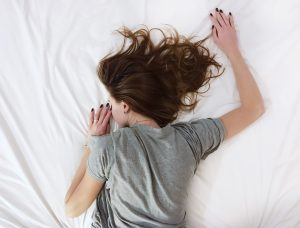39 Expert: Bipolar Disorder and Sleep
BY BRANDY HIGGINS, RN, BSN

I love to sleep. Unfortunately, I have battled my whole life to sleep normally. My mental illnesses make it really hard for me to sleep like an average person. I have insomnia.
When I’m depressed, I will have trouble falling asleep and staying asleep. When I finally fall asleep, I will sleep more than 12 hours per day. When I am manic, I have trouble falling asleep and staying asleep and I sleep less than 8 hours per day. When I have a euthymic or “baseline” mood, I still struggle with insomnia but I sleep 8-10 hours per day.
I have always noticed that I function better and my moods are more even when I get enough sleep.
Good sleep became my top priority when I was diagnosed with bipolar disorder. Sleeping problems can trigger mania. At the time of my diagnosis, I had a newborn baby, so getting regular sleep at that time was especially challenging. However, I have always noticed that I function better and my moods are more even when I get enough sleep.
Keeping a normal sleep routine is so important for me to stay well. Sleeping fewer hours over a few days will cause me to have manic symptoms. If you have a diagnosis of bipolar disorder, you should contact your mental health provider if you are having trouble with your sleep.
Getting a good night’s sleep is considered important self-care. Below are the tips I use to get a good night’s sleep. For more great information on sleep, check out the National Sleep Foundation.
Sleep Routine
- Keep a regular sleep schedule. Wake up at the same time every day even on weekends and vacations.
- Go to bed at a time that allows you to get at least 8 hours of sleep a night and stick to it.
- Limit naps to 30 minutes a day. Naps do not make up for lost sleep.
- Establish a relaxing bedtime routine.
Sleep Environment
- Make your bedroom quiet, dark and relaxing. Keep the room at a comfortable, cool temperature. I have room darkening curtains and a sleep mask to help with that.
- Use your bed only for sleep.
- Do your best to get enough natural light during the day.
- Turn the lights down a few hours before bed. Use a blue light filter on your screens like your phone or laptop.
- Turn off electric devices an hour before bed. Spend this time reading a book, take a shower, or pray/meditate.
Exercise and Nutrition
- To improve sleep, stop eating 2 hours before bedtime.
- Exercise regularly at least 3-4 hours before bed.
- Avoid caffeine and alcohol later in the day.
Some signs of poor sleep hygiene include waking up throughout the night and being sleepy during the day. Just a few changes in your sleep hygiene can make all the difference. I strive to get 8 hours per night, but I haven’t been successful without medications. In the past, I have used herbal supplements, but some medications make me sleep 10-12 hours per night. There are many herbal supplements, over-the-counter medications, and prescription medications for sleep. Remember, no matter what you use, that you discuss it with your mental health provider so that you know it is safe to take with your other medications.
About the Author
Brandy Higgins, RN, BSN is the writer of Live Mentally Well: Better Living Thru Mental Wellness. She is a lifelong mental health survivor and former mental health nurse. Live Mentally Well is impacting our community and the world by empowering, encouraging, and educating one person at a time to end stigma for good. Brandy writes about mood disorders, postpartum mood and anxiety disorders, postpartum bipolar disorder, Christian mental health, anxiety disorders, childhood trauma, natural medicine, PTSD, and dissociative disorders.